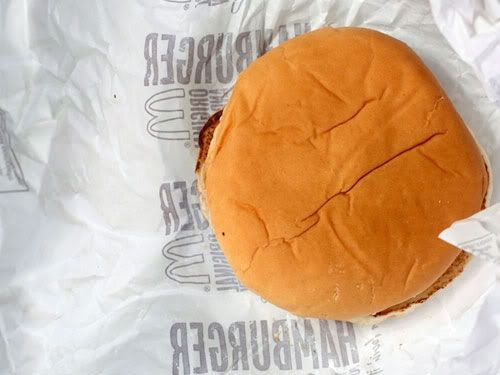Though not one to center every meal around fast food, I believe it has its place in a healthy diet and a healthy society, and people being so adamantly anti-fast food has always caused me a slight bit of anguish (might as well be a little dramatic). Sadly, it seems the first side publicized of every story is the most likely to be accepted, people have embraced the unusually high amount of preservatives and salt to be the explanation for this discovered and rediscovered phenomenon. It always takes a lot more work to prove the other side, and that couldn't be more true in this case. People on the anti-McDonald's side simply observed that the burgers seemed not to be decomposing and hypothesized that it had to be because they had an unhealthy amount of preservatives and salt. That's only two steps (observation and hypothesis) out of the seven steps of the scientific method (four if you credit that thinking fast food burgers are unhealthy is qualifies as identifying a problem and that the hypothesis is a conclusion as well). To disprove it, someone would most likely have to go through all seven steps (including designing, undertaking and analyzing an experiment) as well as work hard to distribute that information to people who had already accepted the other side. I, for one, know first-hand what the latter part feels like, but that's for another post (maybe). I never saw the decomposition as a reason to avoid the burgers, but I was disappointed in how widely it was accepted. I thought that was the end of it and that nobody would or could disprove the other side.
Well, someone finally decided to undertake just such a venture. J. Kenji Lopez, from The Food Lab (link below), chose to do so out of a hate for "bad science", as she puts it. Though I could go over the details from Serious Eats (link below) and possibly bore you to tears, I'll just summarize the results (sorry for the spoiler). She compared the weights, moisture and mold of several different meat and bun combinations (fast food, homemade and mixed) over time. She even compared them to larger (quarter pound) variants. It turns out that, while larger burgers show signs of decay, the smaller burgers (both homemade and fast food) do, in fact, decompose, but they do not show visible signs of mold because the small size, relative to the great surface area, allow moisture to evaporate quite quickly. Since the moisture dissipates quickly and since the burger meat is pretty sterile to begin with, it seems the mold does not have the opportunity to take root and thrive. This concept that mold does not prosper where there is no humidity is nothing new, and she is apt to compare it to beef jerky.
Neither she nor I wish this to prove that the burgers are healthy. She wants to disprove bad science. I, on the other hand, wanted to point out how quickly a misinterpretation, if properly (or improperly) disseminated, can tilt the public perception and opinion. People do not tend to explore everything in a scientific manner, and it seems that biased information, if received first, especially through common trusted and mainstream channels (media and word-of-mouth), can overpower a proper and objective interpretation. It's tough to look at both sides of a story when someone we trust feeds us one side and so adamantly backs it. Though it may be difficult, and it has been advised more times than I can count, I really do think everyone should try to take in both sides of a story before making a decision.
So, on that note, McRib anyone?
Link:
The Food Lab: Facebook
Serious Eats: Website

No comments:
Post a Comment